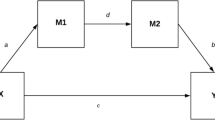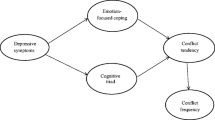Abstract
Causal attributions (i.e., locus, stability, globality) and responsibility attributions (i.e., bad intent, selfish motivation, blame) were assessed in the spouses of 27 depressed psychiatric inpatients and 30 nondepressed dyads to test predictions derived from Hooley's (1987) “symptom-controllability” model of marital distress. Results indicated that (1) depressed patients and their spouses were less dyadically adjusted than nondepressed spouses, (2) causal and responsibility attributions about depressive behaviors predicted lower dyadic adjustment, and (3) attributions of causality mediated the relationship between group status (depressed or nondepressed) and dyadic adjustment among spouses who had higher expectations for their partner to change. Results suggest that among spouses with a high expectancy for change, depression may be a risk factor for marital distress.
Similar content being viewed by others
References
Baron, R. M., & Kenny, D. A. (1986). The moderator-mediator variable distinction in social psychological research: Conceptual, strategic, and statistical considerations.Journal of Personality and Social Psychology, 51, 1173–1182.
Baucom, D. H., Sayers, S. L., & Duhe, A. D. (1987, November)Attributional style and attributional pattern among married couples. Paper presented at the anuual meeting of the Association of Advancement of Behavior Therapy, Boston.
Bauserman, S. A. K. (1992).Attributions of blame in spouses of depressed patients, Unpublished doctoral dissertation. Athens: University of Georgia.
Beach, S. R. H., & O'Leary, K. D. (1986). The treatment of depression occurring in the context of marital discord.Behavior Therapy, 17, 43–49.
Beach, S. R. H., Sandeen, E. E., & O'Leary, K. D. (1990).Depression in marriage. New York: Guilford Press.
Beck, A. T., Ward, C. H., Mendelson, M., Mock, J. E., & Erbaugh, J. K. (1961). An inventory for measuring depression.Archives of General Psychiatry, 4, 561–571.
Beck, A. T., Steer, R. A., & Garbin, M. G. (1988). Psychometric properties of the Beck Depression Inventory: Twenty-five years of evaluation.Clinical Psychology Review, 8, 77–100.
Biglan, A., Hops, H., Sherman, L., Friedman, L. S., Arthur, J., & Osteen, V. (1985). Problem-solving interactions of depressed women and their husbands.Behavior Therapy, 16, 431–451.
Biglan, A., Rothlind, J., Hops, H., & Sherman, L. (1989). Impact of distressed and aggressive behavior.Journal of Abnormal Psychology, 98, 218–228.
Bradbury, T. N., & Fincham, F. D. (1990). Attributions in marriage: Review and critique.Psychological Bulletin, 107, 3–33.
Brown, G. W., & Harris, T. O. (1978).Social origins of depression: A study of psychiatric disorders in women. New York: Free Press.
Coyne, J. C. (1976). Towards an interactional description of depression.Psychiatry, 39, 28–40.
Coyne, J. C., Kahn, J., & Gotlib, I. H. (1987). Depression. In T. Jacob (Ed.),Family interaction and psychopathology (pp. 509–533). New York: Plenum.
Coyne, J. C., Kessler, R. C., Tal, M., Turnbull, J., Wortman, C. B., & Greden, J. F. (1987). Living with a depressed person.Journal of Consulting and Clinical Psychology, 55, 347–352.
Fincham, F. D., & Bradbury, T. N. (1992). Assessing attributions in marriage: The Relationship Attribution Measure.Journal of Personality and Social Psychology, 62, 457–468.
Fincham, F. D., & Bradbury, T. N. (1993). Marital satisfaction, depression, and attributions: A longitudinal analysis.Journal of Personality and Social Psychology, 64, 442–452.
Fincham, F. D., Beach, S. R., & Bradbury, T. N. (1989). Marital distress, depression, and attributions: Is the marital distress-attribution association an artifact of depression?Journal of Consulting and Clinical Psychology, 57, 768–771.
Gotlib, I. H., & Hammen, C. L. (1992).Psychological aspects of depression. New York: John Wiley & Sons.
Gotlib, I. H., & Hooley, J. M. (1988). Depression and marital distress: Current status and future directions. In S. W. Duck (Ed.),Handbook of personal relationships (pp. 543–570). Chichester, England: John Wiley & Sons.
Hooley, J. M. (1987). The nature and origins of expressed emotion. In K. Hahlweg & M. J. Goldstein (Eds.)Understanding major mental disorder: The contribution of family interaction research (pp. 176–194). New York: Family Process Press.
Hooley, J. M., & Teasdale, J. D. (1989). Predictors of relapse in unipolar depressives: Expressed emotion, marital distress and perceived criticism.Journal of Abnormal Psychology, 98, 229–235.
Hooley, J. M., Orley, J., & Teasdale, J. D. (1986). Levels of expressed emotion and relapse in depressed patients.British Journal of Psychiatry, 148, 642–647.
Hooley, J. M., Richters, J. E., Weintraub, S., & Neale, J. M. (1987). Psychopathology and marital distress: The positive side of positive symptoms.Journal of Abnormal Psychology, 96, 27–33.
Jacobson, N. S. (1992). Behavioral couple therapy: A new beginning.Behavior Therapy, 23, 493–506.
Jacobson, N. S., Dobson, K., Fruzzeti, A. E., Schmaling, K. B., & Salusky, S. (1991). Marital therapy as a treatment for depression.Journal of Consulting and Clinical Psychology, 59, 547–557.
McGill, C. W., Falloon, I. R. H., Boyd, J. L., & Wood-Siverio, C. (1983). Family educational intervention in the treatment of schizophrenia.Hospital and Community Psychiatry, 10, 934–938.
Paykel, E. S., Myers, J. K., Dienelt, M. N., Klerman, G. L., Lindenthal, J. J., & Pepper, M. P. (1969). Life events and depression: A controlled study.Archives of General Psychiatry, 21, 753–760.
Rehm, L. P. (1988). Assessment of depression. In A. S. Bellack & M. Hersen (Eds.),Behavioral assessment: A practical handbook (2nd ed.). New York: Pergamon Press.
Robins, C. J. (1988). Attributions and depression: Why is the literature so inconsistent?Journal of Personality and Social Psychology, 54, 880–889.
Rounsaville, B. J., Weissman, M. M., Prusoff, B. A., & Herceg-Baron, R. L. (1979). Marital disputes and treatment outcome indepressed women.Comprehensive Psychiatry, 20, 483–490.
Spanier, G. B. (1976). Measuring dyadic adjustment: New scales for assessing the quality of marriage and similar dyads.Journal of Marriage and the Family, 38, 15–28.
Townsley, R. M., Beach, S. R. H., Fincham, F. D., & O'Leary, K. D. (1991). Cognitive specificity for marital discord and depression: What types of cognition influence discord?Behavior Therapy, 22, 519–530.
Author information
Authors and Affiliations
Rights and permissions
About this article
Cite this article
Bauserman, S.A.K., Arias, I. & Craighead, W.E. Marital attributions in spouses of depressed patients. J Psychopathol Behav Assess 17, 231–249 (1995). https://doi.org/10.1007/BF02229300
Accepted:
Issue Date:
DOI: https://doi.org/10.1007/BF02229300




